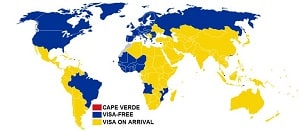Ethnic Composition In Cape Verde

Cape Verde is an archipelago with a diverse cultural and ethnic composition. The ethnic makeup of the country is the result of centuries of mixing between various African, European, and other influences. Here’s an overview of the ethnicities in Cape Verde:
Cape Verde Ethnic Composition
Creole (Mixed African and European Descent)
Cape Verde Majority Group: The vast majority of Cape Verdeans are of mixed African and European descent, commonly referred to as Creole or mestiço.
Cape Verde Origins: The Creole population is a result of intermarriage between African slaves brought to the islands during the transatlantic slave trade and Portuguese colonizers. Over time, other European influences, such as those from Italy, France, and Spain, have also contributed to the gene pool.
Cape Verde Cultural Impact: The Creole culture is deeply rooted in the Cape Verdean way of life, influencing language (Kriolu), music (morna, funaná, coladeira), cuisine, and traditions.
African Descent
Cape Verde African Descent and Origins: Many Cape Verdeans can trace their ancestry directly to West African ethnic groups, such as the Mandinka, Wolof, Fulani, and Balanta.
These groups were brought to Cape Verde during the period of the slave trade.
African Descent Cultural Influence: African heritage is prominent in traditional music, dance, and religious practices, blending with European elements to create unique cultural expressions.
Cape Verde European Descent
Cape Verde European Descent and Origins: A smaller proportion of the population is of direct European descent, primarily from Portugal. This group includes the descendants of early Portuguese settlers and later European immigrants.
Cultural Influence: European influences are evident in the architecture, religion (predominantly Roman Catholicism), and legal and educational systems.
Other Ethnic Influences
Jewish and Moorish Influences: Historical records indicate the presence of Jewish and Moorish settlers during the early period of Portuguese colonization, contributing to the ethnic and cultural mosaic of Cape Verde.
Recent Immigration:z In more recent times, Cape Verde has seen small communities of immigrants from countries like China and Lebanon, contributing to the diversity.
Cape Verde Cultural Identity
Cape Verde Language
Cape Verde | Portuguese: The official language of Cape Verde, used in government, media, and education.
Kriolu (Cape Verdean Creole): A widely spoken Creole language that varies slightly across the islands. It is a symbol of national identity and everyday communication.
Cape Verde Music and Dance
Cape Verde Morna: A soulful and melancholic genre often compared to the blues, popularized by Cesária Évora.
Cape Verde Funaná: A fast-paced, accordion-driven dance music with African rhythms.
Cape Verde Coladeira: A lively, danceable music style that reflects the mixed cultural heritage.
Cape Verde Religion
Cape Verde Predominantly Roman Catholic: The majority of Cape Verdeans practice Roman Catholicism, reflecting the Portuguese influence.
Cape VerdeProtestant and Other Faiths: There are also Protestant communities and followers of other faiths, including traditional African religious practices.
Cape Verde Festivals and Traditions
Cape Verde Carnival: Celebrated with great enthusiasm, particularly in Mindelo (São Vicente), featuring parades, music, and dance.
Cape Verde Tabanka: A traditional festival celebrating African heritage, featuring processions, music, and rituals.
Cape Verde Social Dynamics
Cape Verde Unity in Diversity: Cape Verdeans take pride in their diverse heritage, with a strong sense of national identity that transcends ethnic differences.
Cape Verde Diaspora: A significant number of Cape Verdeans live abroad, particularly in the United States, Portugal, and other European countries. The diaspora plays an essential role in the cultural and economic life of Cape Verde.
Cape Verde ethnic Conclusion
Cape Verde’s ethnic composition is a rich tapestry woven from African, European, and other influences. This diversity is a cornerstone of the nation's cultural identity, shaping its language, music, traditions, and social fabric. The harmonious blend of these influences makes Cape Verde a unique and vibrant country.





 |
|  |
|  |
|  |
| 